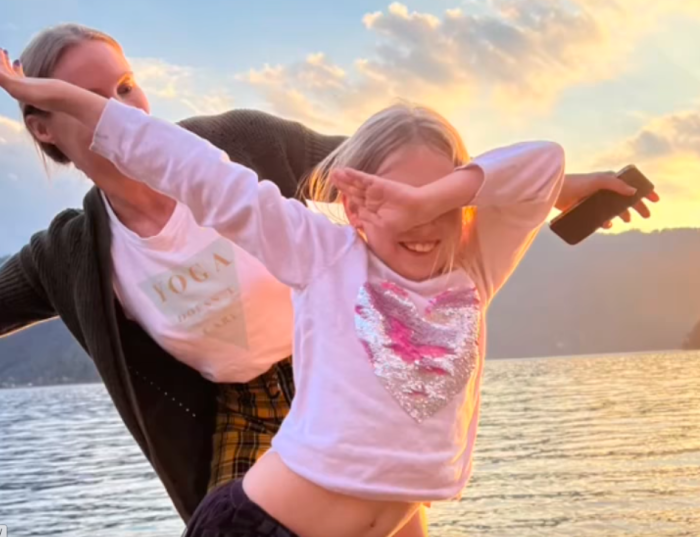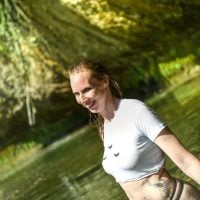When thinking about raising our children to be body positive, I like to view it more as raising our children to realise that all bodies are natural and different—just like nature—and all are beautiful without question.
When we look into the forest, we see trees bent and twisted in all shapes and they are each uniquely beautiful. Flowers bloom differently and at different times, and we do not question nature, we just admire them in all their glory.
I feel we must also raise our children to see bodies simply as bodies—not bodies with clothes or differences or not, or bodies that need to be dressed to hide certain aspects of them or not, but bodies as tools for life.
I feel we need to break the stigmas and untruths by squashing our own shame and rewriting our body shame narratives as parents.
When I was little, my mom would never go swimming with me. She criticised her body and thought she was fat. Her mother also told her she was stumpy and that certain dresses would not suit her.
Two things struck a chord with me as a parent: one, I would never tell my daughter words like this. Instead, I remind her she is beautiful just like my mom did to me. Two, I would work on loving myself even though I had been bullied my whole life for my looks and have hated many parts of myself. I swore to myself when I became a mom not to let my hang-ups stop me from doing things with my daughter or in life.
My daughter’s friend always says to me, “You have a thin face, thin lips, and zig-zag nose.” My brother let the buggy go when I was a child and I ran into a wall and broke my nose. So, I told her the story and she smiled and said, “Cool.” That was the end of that.
Instead of being ashamed of the features I cannot change, I explained to her why they exist and the different genetics we inherit. Our differences are our superpowers, and they make us beautiful. That is our household motto.
I feel we also need to have more real conversations with our children from the start when they ask questions about anatomy or sexuality—how men and women make children, for example.
When my daughter was seven, she asked me why men have penises and women have vaginas. I explained that the penis goes into the vagina and the men have sperm that fertilises the egg where the baby is made. She said wow, and we moved on with no shame.
I also spoke to her about menstruation and how it makes me feel and what occurs. I showed her the tools and we spoke about the blood. This has become a natural part of her upbringing rather than a forbidden or shameful subject.
At the same time, we also have many laughs. I ask her to stop growing as her head is now too tall to be my boobie holder. She laughs and says soon she will be as tall as me. My daughter also loves makeup. My partner was uncomfortable because she likes to wear it. He says she is beautiful without it. I asked her why she likes it, and she says she likes the sparkles. My husband and I realised that makeup was just a fun and shiny experience, and it doesn’t have to be what adults see it as. We celebrated this idea and the crazy faces she made.
At our home, we treat the body as a part of life. We shower, run around naked, and allow her to dress as she wishes. We create a no-shame environment. The body in our house is just part of the human experience where she can ask questions comfortably and understand it; it does not control her life nor do her looks. She is reminded her body is a tool for life to create her life experiences like walking, connecting with others, going to school, and laughing with friends.
Being body positive doesn’t have to be a script in our houses. We need to write our own scripts and be open as parents to having real conversations with our children. We also need to work on our own issues and share them, too.
I work often as an artist and do nude photography in movement. When I receive my photos, I sit with my daughter and partner and share the photos. She sees the beauty in them and that is natural and accepted in our family. I do not try to hide it or feel ashamed of it. She has also joined me in photo sessions and spoke with the photographer and enjoyed learning about art.
My personal view concerning the body-positive message is that we need to realise the body is a normal part of being human. We, as adults, need to share it that way rather than sharing the messages of shame and stigmas of society and social media.
I have learned all of the hang-ups I have about my body from outside voices.
When I am alone with my body, I do not question it; I appreciate it for the daughter it gave me, and the life it creates for me to experience. My body never stops me from doing things—only the voices in my head do.
My body is always capable, but my mind is the battlefield I work on daily.
My daughter makes me see myself with love. She loves my skin and body. She is always saying I am her beautiful mama and she loves me just as I am—as I also say to her. She is my beautiful daughter, and I love her just as she is.
For me, body positivity is just about being real. It’s about being the upward spiral of kindness, having love, and working on our own hang-ups so they do not become our children’s.
We will always be told we have flaws, but in the eyes of those who love us, we will always be beautiful just as we are. We must also be taught to love ourselves just as we are—right from the beginning.
As parents, it’s important that we role model self-love and how we work on ourselves. We must deliver loving messages to our children to accept and appreciate the skin they are in and all humans are in.
Our kids must understand that our differences are beautiful and they are our superpowers. Our bodies were made for all humans to walk this earth and create our magic lives.







Read 0 comments and reply